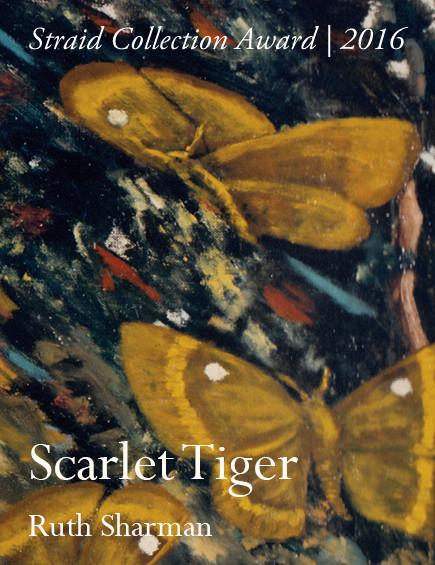The most recent collection by Ruth Sharman, Scarlet Tiger, Templar Poetry 2016, won the 2016 Straid Collection Award. It is dedicated to her father and to her son. It is a substantial collection, featuring fifty-nine poems divided in three sections. The first part is mainly about her father and their relationship; the second one is about her son and the last section is on butterflies and paintings, that is ekphrasis, descriptions of paintings in words.
References to butterflies and moths is a leitmotif that recurs all over the book. Her father used to collect butterflies catching them with a net, trapping them in a jar and finally piercing them with a pin to ‘fix a soft abdomen in place’. He clearly loved and enjoyed nature but had also an ambivalent attitude of caring for animals, that is he also trapped and killed them. This is never said plainly in Sharman’s poems, which often allude. Her poetry isn’t a straightforward kind of poetry (though she wittily says at the beginning of the first poem, By heart, ‘I want to get things straight’), it is a sort of ‘slant’ poetry. And maybe things are never easy to express in poetry and in life; they are often complex, hinted, interpretable, alluding to something else. The final sense often eludes us, slips away whenever we believe we are holding it.
She has a touching affectionate way of remembering her father, although never sentimental, especially during his last days. He couldn’t catch real butterflies any more, only paint them in faded watercolours, a sad, compassionate image of his losing grasp with reality. From her poems, his father emerges as a brave, tough person though helpless in front of death, a bit of a British stereotype: shy, awkward, complex; woods were his heaven and his final advice was to ‘beware strong emotions’.
Being Italian and an opera goer, I can’t help linking the theme of butterflies to Madama Butterfly by Giacomo Puccini, a story where the protagonist is exactly pinned down by social conventions and her desperate love for her deceitful husband. She is literally pierced in the final act when she commits hara-kiri. A beautiful butterfly caught in a fatal trap. So butterflies seem to be linked to images of women.
In another poem the poet compares herself to a moth:
I’m hovering like a moth (Dusk)
Differently from colourful butterflies, moths are
difficult to pin down in a book….
They’re pictures out of focus.
A reminder of otherness
and elsewhere, of only half
belonging in the world of light. (What is it about moths?)
The poem that titles the collection, Scarlet Tiger, is exactly about a moth who refuses to feed; a mutant, who takes its time to change then flies away. I couldn’t help linking it to an essay by Virginia Wolf, The Death of the Moth, where moths are described as ‘hybrid creatures, neither gay like butterflies nor sombre like their own species.’ She narrates him struggling against the approaching inevitable death and acknowledges there is nothing she can do to help. What Virginia Woolf particularly admires is the’ gigantic effort on the part of an insignificant little moth, against a power of such magnitude’.
Another recurrent theme is fire (After the fire and Tabula rasa), a real experience or a symbolic one (it doesn’t matter in the end) that burns the past, objects and memories, and leaves you dispossessed but lighter.
The poems about her son are cute memories of a mother observing how her child grows, learns and plays; sometimes his peaceful attitude is compared to a Buddha.
My favourite poem in this series is Curtains, a ‘slant’ poem again, where the thin ‘dark wine, wet sand’ sarong curtains ‘bought on honeymoon’ enwrap the baby like a womb, shading his quiet sleep, letting the light in, hinting to his conception and birth and to what came after:
We switched to blue velvet later
to block out the light
and the flesh-and-blood patterns hang
in the new house, in a room
that’s sometimes spare,
sometimes his dad’s, depending.
The poems of the last section, mainly about paintings, are evocative and graceful but less poignant than the previous ones.
The last poem of the collection, Wishing tree, is a philosophical poem meditating on human beings and life:
longing to connect, longing
for answers from somewhere
beyond ourselves – never
quite at home in the moment,
the moment never enough,
Our shifting, ever changing kind of being is never completely happy or satisfied, even in our best moments. We don’t seem to be able to live in the moment plentifully, except in dreams or in fragmented instants rapidly shifting through time.
Scarlet Tiger is a collection of brilliantly crafted, subtle poems to be enjoyed till the last line.
Order your copy of Scarlet Tiger here: https://templarpoetry.com/products/scarlet-tiger

